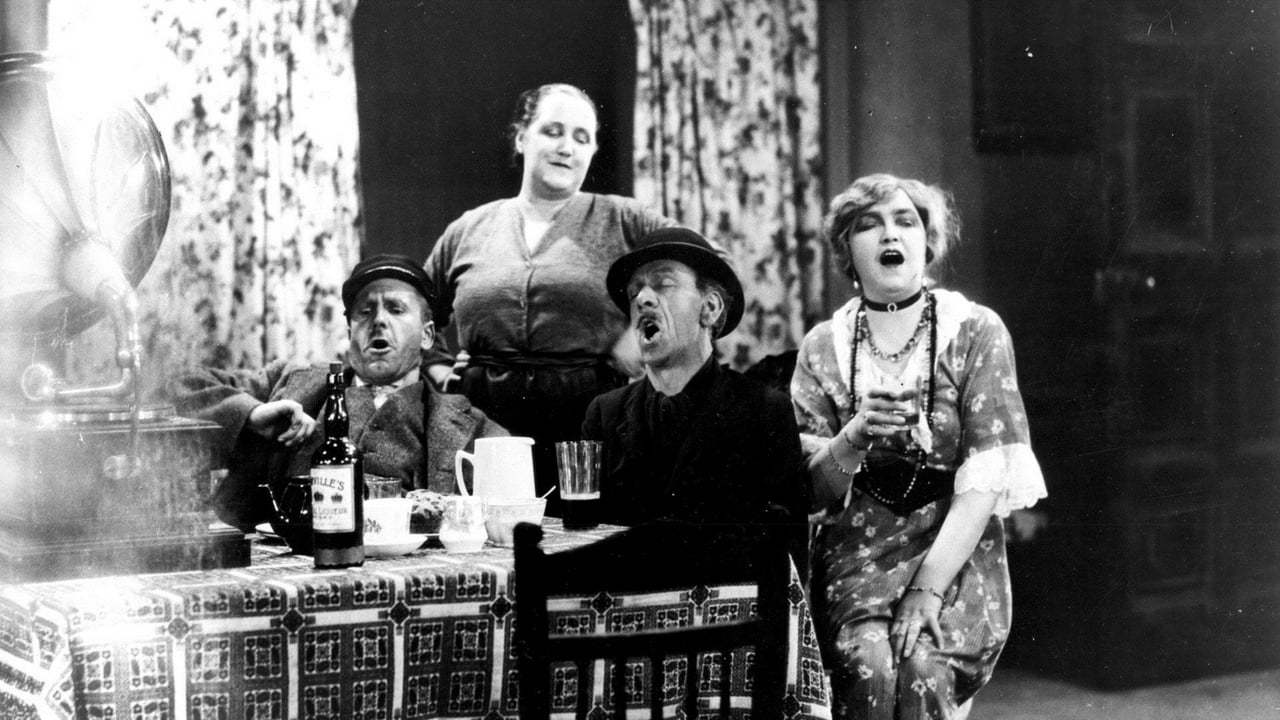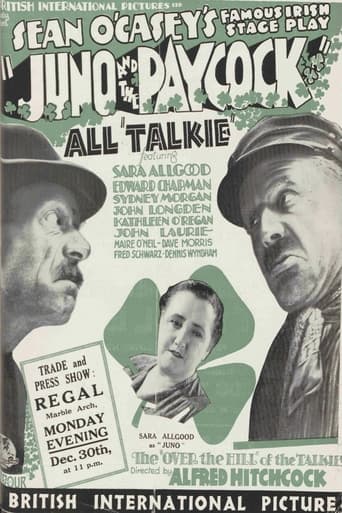ElMaruecan82
"Juno and the Paycock" is not a Hitchcock film, this is a film that 'happens to be' directed by Hitchcock. The difference is simple: the film is such a faithful adaptation of Sean O'Casey's successful play of the same title that he can stand as the film's honorific director. This is not to discount Hitchcock's contribution but the Master had his three-decade streak coming so this can be seen as an early warm-up with the then-rising sound technology, but the film is as close to Hitch' universe as Walt Disney is to Russ Meyer.The story is about a dysfunctional family, the Boyles, the father is a loafer who spends time drinking with his friend (and efficient comic-relief) Joxer and talking about his 'glorious' naval past (he's nicknamed Captain, but his tendency to exaggerate his stories doesn't fool anyone). And there's Juno, the responsible and mature housewife, played by Sara Allgood, she was the matriarch in "How Green Was my Valley" but this is where the comparison ends. While John Ford's nostalgic journey in the Welsh country was painted with the beatifying light of nostalgia, "Juno and the Paycock" is a challenge to all the stereotypes about the Irish Family that movies have been nurturing for years, no kids that can be counted by the dozen, no Catholic overzealous devotion, no noble-hearted poor and no men of virtue.For some strange reason, we tend to idealize the past, confident that it was a time where men were men, and women women, time where people fulfilled their duties. We also tend to idealize the spirit of poor people, as if the lack of money was compensated by the gold in their heart. Rubbish, mediocrity is timeless and has no social barriers, the poorer, the more bitter these people get. And the least Captain Boyle works the least he wants to work again and only counts on his woman to carry the house. Sean O'Casey makes a play of high sociological value, setting the story in one of these brownish tenements our memories usually borrow from Jim Sheridan's movie or sketches about Irish community. And the dysfunctional aspect of the family, that slap in the face, also extends to the Irish context.The film is set in the midst of the Civil War and it's not just a colorful detail as it opens with a long oration from Barry Fitzgerald praising the people's courage. This is where Hitchcock's sense of humor shows its head, the many close-ups on the ugly mugs shows a funny contrast between the speech and the reality, and then the reaction from the gunfights says a lot about these men's spirit. The opening sets the tone: this is a film set in a world where men have ceased to prove their value and woman carries the cross. The only seemingly positive male character is Johnny; the son who just lost his arm in a fight yet seems to hide a more painful wound. Another man is courting Mary, the daughter, but she's in love with a young solicitor named Bentham and he's got good news for the Boyles.The second act deals with the inheritance, a cousin leaves his fortune to Boyle whose reflex is to immediately snub his buddy, if money can't buy love, it can't bring much dignity. The Boyles start buying fancy furniture, show off their fortune, enjoys the music from their gramophone and while a funeral procession pass near their house, even Juno can't empathize with a mother mourning her son, also killed in the war. It says a lot about the way wealth conditions our behavior and clouds our empathy. The Boyles discuss with Bentham matters of religion, wondering what can exactly fascinate people in this. For all the Catholic faith we supposed Irish people are impregnated with, here is an Irish playwright giving us a glimpse of how malleable their faith are, like everyone's.Even while recalling his pasts on the boat, Boyle remembers the question he used to ask himself "what brings the stars?" God doesn't strike as an obvious answer, a loser is likely to lose his faith … and loses it more when luck strikes. Naturally, the third act will change everything, a mistake from Bentham will prevent them from getting the money, out of shame, he'll leave Mary pregnant, as for Johnny, he'll be taken away for reasons explaining his torment all through the film. Boyle is treated like dirt by the tailor and the female neighbor, both come to take the stuff he bought by credit, and when he goes to buy his last drink with Joxer, as if nothing happened, only Juno stays with Mary, instead of one father, she'll have two mothers, and this is one of the greatest quotes I've ever heard in a film.The film ends on the poignant eulogy of faith, in an empty room emphasizing the isolation of men when adversity becomes too hard to handle, and this is the irony of faith, too much troubles make us question it, and sometimes, we're so desperate, we need something to hook on, not to drown in an ocean of desperateness. Mary doesn't believe in God, but Juno has a good answer "what can God do with men's stupidity?" one might think if God is so powerful, he should prevent it, but even Einstein had a few wise words about the unlimited aspect of men's stupidity."Juno and the Paycock" was a revelation to me, a real slap in the face. It has nothing to do with Hitch' canon yet the fact that it is associated with Hitchcock's name is the film's ironic blessing because this is exactly why most movie buffs will be curious enough to discover one of 'Hitchcock's earlier films, so maybe apart from Irish or British people, thanks to Hitchcock, the work of Sean O'Casey will never totally sink into oblivion.
MartinHafer
Before I begin the review, I would like to point out that watching this film isn't easy--particularly for people aren't used to the strong accents. That's because in addition to struggling to understand them, it gets worse because the sound is so bad AND there are no closed captions. I hope there is a better and cleaned up version out there, but I doubt it. My copy is from a cheap box set of Hitchcock's films, but whenever I have seen this film on DVD, it's been in similar sets--where captions and film preservation aren't particularly important.As for the film, like almost all of Hitchcock's films before 1934, most of his films defy a specific genre. While he did THE LODGER, most of his silent and early sound films have nothing to do with suspense or mystery. So the fact that JUNO AND THE PAYCOCK might seem nothing like a Hitchcock film is simply because there was no "Hitchcock Style" yet.JUNO AND THE PAYCOCK is a look at an Irish family and their rather ordinary and stereotypical lives. The husband, the Captain, isn't a captain at all but a lazy drinker who avoids work at all costs. The wife, Juno (Sara Algood), is a long-suffering woman who tries to make good with what they've got--which isn't much. The first 30 minutes of the film features no tangible plot--just the Captain talking and talking and talking with various friends and then his wife. This is all pretty dull. Later, the couple learn that they've come into an inheritance and their lives are thrown into a tizzy. They begin having all kinds of ideas about living high off the hog, only by the end of the film to find out that it's all for naught. Sadly, there really isn't more to the film than this.I think how good this film is to the viewer probably depends a lot on your perspective. I am sure an Irish person or someone with Irish heritage would look at this a lot different than me, an American without a drop of "green" blood. To me, it's all just a long and dull talk-fest with little to recommend it. Hitchcock has obviously worked hard to create such vivid characterizations here, but don't expect THE QUIET MAN or the like.
75groucho
Gee, maybe that's not fair. Maybe it's just that the Irish have a better heritage of articulating hard times. "Juno and The Paycock" is the epitome of tales of woe and suffering from the Irish urban poor during The Troubles of the early 20th century. The family has all the stereotypical travails: Joblessness due to alcoholism, joblessness due to labor union strikes, involvement with the Republican Army, and all these problems fall across the shoulders of the long-suffering mother, Juno.If such a thing can be imagined, it gets worse. The family believes they will fall into some money, so they (foolishly) run up debts. This begins the 'comic' part of the film's tragi-comedy structure. When hopes prove to be false the family is devastated.A relentlessly downbeat story that sees an interlude of clearly false hopes followed by a tragic ending, is considered a chestnut of the Irish playwright Sean O'Casey. For viewers, anyone who can't understand the thick Irish brogues on the equipment used in an early talkie will have no chance to understand the dialogue. Worst of all the nature of the story really doesn't suit the talents of even a young Alfred Hitchcock. Even by that point in his career, he had begun to make compelling suspense pictures and this film is not in his wheelhouse. Even taking exception for budget and circumstances that would have obligated him to take on this film as an early sound project, "Juno and The Paycock" does little to distinguish the work of Sean O'Casey and even less for Hitchcock. It should be avoided, even by Hitchcock completists.

